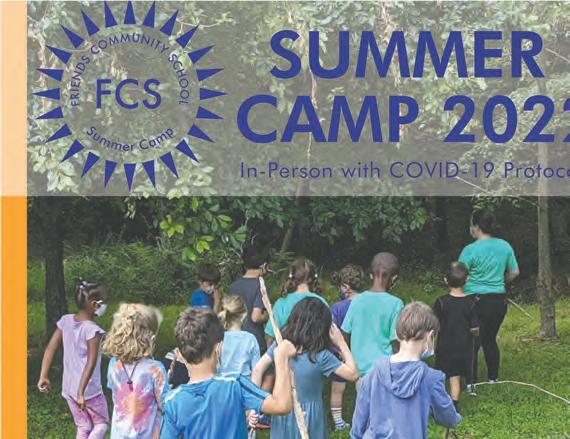
7 minute read
Choosing a Summer Camp – There’s Still Time To
CHOOSING A SUMMER CAMP
There’s Still Time To Sign Up!
Summer camp is a time to build memories – a place for kids to wile away the summer hours but also a time to develop new interests and skills. Camp professionals are teachers and mentors who in uence, advocate, shape and protect their campers.
“Not only do camp programs help families with childcare needs in summer,” said DC Department of Parks and Recreation (DPR) Seasonal Programs Manager Vanessa Gerideau, “our goal is also to provide the child with bene ts of social interaction, emotional development, physical activity and an introduction to leisure activities that could really have an impact on their childhood.”
But from all the summer camp options available in and around the District, how do you pick a summer camp that’s right for your child?
The American Camp Association (ACA, acacamps.org) provides
by Elizabeth O’Gorek
Students pose at a Department of Parks and Recreati on (DPR) camp at Friendship Heights Recreati on Center. DPR camps focus on building soft skills and exposing children to life-long leisure acti viti es. Image courtesy: DPR

resources for parents to help them through the decision-making process. There are many factors to consider together with your child’s individual interests and comfort. Safety, camp philosophy, sta and training, camp location and cost are all important factors.
Overnight or Day
You and your child will determine if they are ready for overnight camps, which generally take campers beginning at around seven years of age, or if a day camp is better suited to your needs or their level of comfort with being away from the family. In the District, day camps are o ered for campers as young as three or four years old by DPR, DC Adventure Camps, Busy Bees Music and Arts Camps, Head rst Summer Camps and others.
Gerideau says that day camp should probably not be a child’s rst experience being with a group of children. She says although the DPR day camps have accommodated such needs before, it is probably wise to have children experience playgroups or a half-




Every summer, Shakespeare Theatre Company gives students between the ages of 6 and 18 the chance to dive into the world of one of the most celebrated playwrights in history William Shakespeare. Have fun while learning new skills in acting, voice, movement, text analysis, stage combat, and more. Photo: Shakespeare Theatre Company
day session of structured activity before committing them to a two-week day camp.
The ACA says it is advisable, though not necessary, for a camper to have participated in a day camp before committing to overnight camp for a session of a week or longer. Although every child is different, a spokesperson suggests that a camper can be prepared for the separation of overnight camp by sending them for sleepovers at grandma’s house, or with a trusted friend. “Positive overnight experiences away from home prepare a child for the joys of overnight camp,” he said.
If your child requires a lot of persuasion to get excited about camp, then perhaps a day camp is better suited to their needs at this stage. Only you and your child can make that decision.
Once you have decided on day camp versus overnight camp, there are factors to consider in selecting one, including a child’s interests, scheduling, location, length of camp session and budget. Many specialty camps offer a particular focus, such as art, baseball or aquatics. Choosing a camp that matches your child’s interests will go a long way to holding their attention and keep them happy throughout the camping period.
Activities
It is important to look for a balance between structured and unstructured activities. “Unstructured activities give kids a chance to develop soft skills such as conflict resolution, communication and self-control in a safe, healthy environment,” says Gerideau. “At the same time, a lack of structure can lead to boredom.”
A couple of years ago, Capitol Hill resident Carolyn Bowen put her two children, then aged three and five, into summer day camps. For her older son, she chose Home Run Baseball Camp. The camp has several locations in the District, including Friendship Heights Recreation Center and Payne Elementary School. Bowen said baseball activities held her son’s interest, but the camp also did a great job of allowing for free play and more unstructured activities, such as running through sprinklers. “It reminded me of more

unstructured time, like when we were kids,” she said.
That said, the ACA notes that if families are not nding what they are looking for in terms of specialties, camp is also a great place to try something new. An ACA Youth Outcomes Study found that 74% of campers said they did things they were afraid to do at rst while they were at camp, and 63% of parents say that their child continues to participate in some of the new activities he or she learned at camp after they leave.
Sending your child to a camp where one of his or her friends is attending can also help make the experience a good one. Carolyn Bowen says that this in uenced the decision she made for her son when she sent him to baseball camp. “[Having a friend in the same camp] just made him feel more comfortable,” she said. Some camps, such as Head rst Camps, allow parents to register to be placed in a camp group with a buddy attending the same session.
Cost
Cost is, for most, another important consideration when choosing a camp. Camps in the District and area range from DPR day camps at $5-$150 per week to thousands of dollars per session for overnight specialty camps. In
addition to the cost of tuition, be aware of the potential for additional costs for things like transportation and aftercare costs, t-shirts, photographs, supplies, and additional medical insurance where required.
Safety
As you narrow in on potential camp choices, it is advisable to check if they are ACA accredited. ACA’s acChildren enjoying summer camp. Photo: Adven- creditation process is an tures on the Hill independent safety audit evaluating up to 300 standards of camp management and programming, including the site, food safety, health care, transportation, management, sta ng and program elements such as water safety. It is also a good idea to reach out to the camp sta , especially the Camp Director. You will want to know about the ages and training of the counsellors, and if a particular person will be assigned to your child through their session, or if they will move between leaders. Ask who you can contact if you have concerns during the camp session.
Resources for Finding the Right Camp
With all the options available for kids in the DMV, beginning the search for the right camp can be daunting. Fortunately, there are a few ways to get an overview of potential camps. The ACA provides a camps database, with camps organized by geographic location, day or overnight and with accreditation. Given all there is to consider when choosing a camp for your child, the process can seem overwhelming. It doesn’t have to be. It can be an exciting new experience for both you and your child. Bowen says parents shouldn’t panic if the camps they want ll up, as some are exible and will be adding counselors and spaces. ◆
TEACHING WITH SUCCESS FOR 19 YEARS YEAR ROUND ENROLLMENT




STEM BASED EDUCATION WITH MONTESSORI FOUNDATION
• Certified Licensed Teaching Staff • Spanish Emmersion • Kindergarten Readiness • Superior STEM based academics • Potty Training • Enrichment Classes • AM Meals Provided
SUMMER CAMP AND FALL 2022 ENROLL NOW!
13 Weeks of Science Experiments, Outdoor Exploration & Play Weekly themes compliment our STEM–heavy curriculum both in our classrooms and outside. WEEKLY ENROLLMENT | AGES 2–6, 7:30 AM - 6 PM See our STARS in action.
Follow us on: @northeaststarspreschool www.nestars.net










